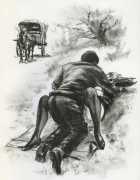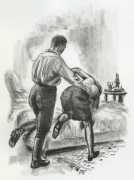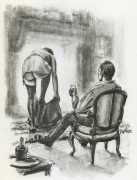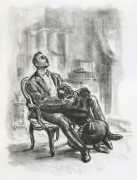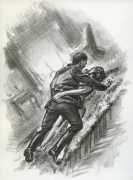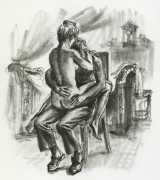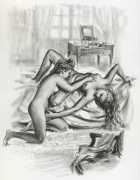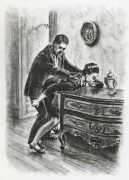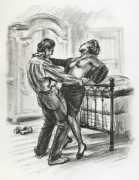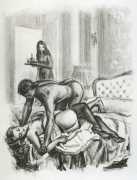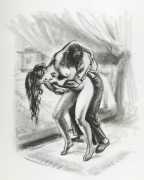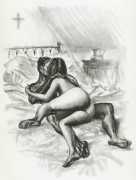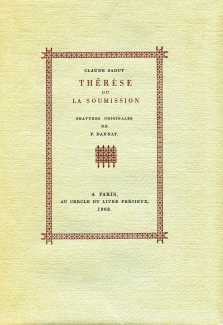 During the 1960s two first-person erotic narratives appeared under the authorship of ‘Claude Sadut’ – this one, Thérèse, ou la soumission (Thérèse, or The Submission) in 1963, and Les jeux de l’orgueil (The Pride Games) in 1968. Both were published by the Paris-based Cercle du livre précieux, who had earlier published the anonymous Émilienne, ou les amours ambiguës (Émilienne, or Ambiguous Loves) with illustrations by ‘F. Dannat’.
During the 1960s two first-person erotic narratives appeared under the authorship of ‘Claude Sadut’ – this one, Thérèse, ou la soumission (Thérèse, or The Submission) in 1963, and Les jeux de l’orgueil (The Pride Games) in 1968. Both were published by the Paris-based Cercle du livre précieux, who had earlier published the anonymous Émilienne, ou les amours ambiguës (Émilienne, or Ambiguous Loves) with illustrations by ‘F. Dannat’.
Thus this limited edition brought together that same pseudonymous illustrator with an equally pseudonymous author. Fortunately we know the true identity of both – the illustrator was Fernand Dantan, and the author was the libertine feminist novelist Régine Desforges. Desforges (1935–2014) is best known for her books, including Le cahier volé (The Stolen Notebook, ), about her teenage experiences in a convent school, La révolte des nonnes (The Revolt of the Nuns, 1981), and Toutes les femmes s’appellent Marie (Every Woman is Called Mary, 2008). But Régine Desforges was much more than just a writer – she ran her own publishing company and a chain of bookshops, fought lawsuits when she published important titles which were considered indecent, and was active in upholding artistic rights. She was married three times, the second time to the publisher Jean-Jacques Pauvert, who also fought the courts to publish authors including the Marquis de Sade.

It is thanks to Pauvert’s admission that we know that ‘Claude Sadut’ was Desforges, writing explicit semi-autobiographical novels incorporating detailed explorations of sado-masochism. Written largely in the form of letters and diary entries, Thérèse experiments (and is experimented with) in a series of dominant-submissive relationships with both men and women. Fernand Dantan’s drawings follow the text closely.
Thérèse was published in a limited, numbered and boxed edition of 1,150 copies.


